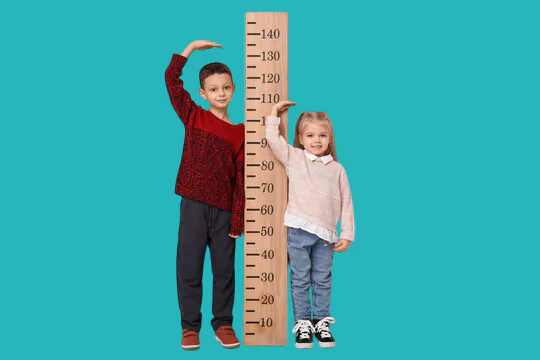Growth retardation is a health problem that worries parents, especially when they notice that their child is not growing at the same pace as their peers.
This term refers to a child's slow physical, mental, or language development compared to the normal rate for their age.
What is growth retardation in children?
Growth retardation is a slowness in a child's acquisition of skills, height, weight, or mental development compared to their chronological age.
Causes of growth retardation in children
Causes vary, including genetic, environmental, and health-related factors, and include:
- Malnutrition and vitamin deficiencies.
- Chronic diseases such as heart and kidney disease.
- Glandular disorders such as growth hormone or thyroid deficiency.
- Genetic factors and a family history of slow growth.
- Premature birth or low birth weight.
- Recurrent infections or chronic illnesses.
- Psychological stress and emotional neglect.
Signs of growth retardation

Signs vary depending on the type of retardation, but the most prominent include:
- Slow weight or height gain.
- Delays in sitting, walking, or speaking.
- Muscle or movement weakness.
- Learning or concentration difficulties.
- Delayed communication or social interaction.
Types of developmental delay in children
Developmental delay is divided into several main types:
- Physical developmental delay: Slow growth in height or weight.
- Mental developmental delay: Weak thinking or learning.
- Language developmental delay: Slow speech or understanding.
- Social developmental delay: Difficulty communicating or interacting.
Factors that increase the risk of developmental delay
There are some factors that make a child more susceptible to developmental delay, such as:
- Chronic malnutrition.
- Genetic diseases.
- Poor health or psychological care.
- Maternal smoking during pregnancy or poor nutrition.
Methods of treating developmental delay
Treatment depends on the underlying cause after a thorough medical examination and includes:
- Nutritional therapy: Improving the diet and increasing essential nutrients such as proteins, iron, and zinc.
- Hormonal therapy: In cases of growth hormone or thyroid deficiency.
- Physical or behavioral therapy: To stimulate motor and mental skills.
- Psychotherapy: To help children with emotional or social problems.
- Regular medical follow-up: To assess improvement and adjust the treatment plan.
Advice for parents to support their child's development

Parents can help their children grow healthily by:
- Providing a balanced diet rich in vitamins.
- Maintaining medical follow-up from birth.
- Providing a safe and stimulating environment.
- Encouraging the child to play and be physically active.
- Ensuring adequate sleep and psychological comfort.
Is developmental delay treatable?
Yes, in most cases, growth can be improved when the cause is identified and treated early.
Is developmental delay permanent?
Not necessarily, as some children catch up with their peers after treatment and follow-up.
When should you be concerned about developmental delay?
When you notice a significant slowdown in physical growth or a delay in skill acquisition compared to children of the same age.
Article Summary
Developmental delay in children may be the result of malnutrition, hormonal disorders, or genetic factors.
However, early diagnosis and appropriate treatment can help restore normal growth and improve a child's quality of life.